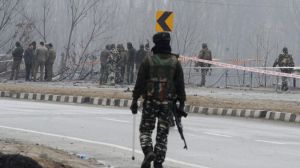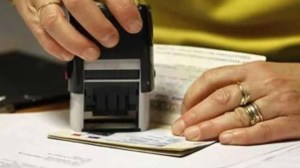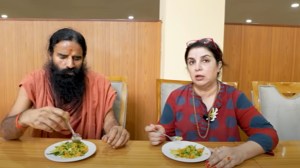Rediscovering France
The diplomatic signals are out. French Foreign Minister Hubert Vedrine arrived in the Capital today to a reception of broad smiles and pow...

The diplomatic signals are out. French Foreign Minister Hubert Vedrine arrived in the Capital today to a reception of broad smiles and power handshakes by Indian officials, sending the message at home and abroad (read Washington) that New Delhi is preparing to raise the Indo-French relationship to a new level.
Vedrine’s joint presidency over a seminar on “multipolarity” along with External Affairs minister Jaswant Singh in the capital today perhaps more symbol than substance nevertheless has, in the pre-Clinton season given New Delhi the opportunity to reiterate its own view of the new world order. That there’s a much larger world beyond the US President’s current obsession with Kashmir and the “dangerous fragility” of the situation in South Asia.
Vedrine’s France, on the other hand, is being “rediscovered” by New Delhi, at least since the Pokharan tests in May 1998, when Paris was the only Western power to react with minimal criticism. The US Secretary of State Madeleine Albright, India remembers, had in colourful contrast described New Delhi as having “dug itself into a hole,” a phrase that her deputy Strobe Talbott has since striven hard to transform into manageable diplomatese.
In the last two years, then, the Indo-French relationship has steadily grown to encompass areas from aids to water, as well as a defence relationship that goes beyond a “buyer-seller” syndrome. The visit by Defence minister George Fernandes in mid-1998 to Paris established the bottomline that India would be interested in pursuing a long-term defence relationship with France, if Paris would in turn commit itself to being a stable and reliable partner.
Government sources say they are not unduly upset by the recent delivery of three French Agosta-B class submarines to Islamabad, in pursuance of an old 1988 contract nor a few other fighter aircraft. Since Kargil, however, New Delhi has made it clear that Paris will have to make a “strategic choice” on the sale of defence equipment in the subcontinent.
Things have obviously moved ahead, what with Vedrine telling a newspaper this week that France would be willing to explore cooperation on civilian nuclear technology to India, if New Delhi could show courage and sign the CTBT as well as the fissile material convention. Vedrine’s statements may well be the first indication that the mutually eternal vows of the nuclear club — that nuclear technology can only be sold to recipient countries who accept fullscope safeguards — may be fraying at the seams. Implicit in the French foreign minister’s comments is the acknowledgement that while India may not be a member of the nuclear-five, the fact that it is a nuclear weapon power cannot be wished away.
To be sure, France will have to work its way around the Nuclear Suppliers Group a key member of which is the US before any such nuclear technology supplies can begin. Nor is Paris likely to very soon dare to cross the “lakshman rekha” circumscribed by Washington after it so successfully dismantled the Soviet Union in end-1991. But the fact that the US openly flaunts its sole superpower status grates on French — and Indian — nerves, since both these nations themselves have aspirations to at least being the dominant power in their respective regions.
Cooperation in nuclear safety with Paris could be a start, something India and the US had themselves set out to do, when the nuclear tests put a stop to that. The interesting thing is that the French are finally willing to take the covers off a subject brought up by none other than President Jacques Chirac during his visit here two days ago.
Russia has been the only other country in this post-Cold War decade to even feebly challenge the rules of the new world order imposed by the US. It’s an open secret that on the eve of cancelling a contract to supply space technology to India in 1993, Russian scientists had already transferred most of the technology wanted by ISRO. Later, Moscow invoked a 1988 agreement to contract two civilian nuclear power plants at Kudankulam in Tamil Nadu, arguing that it predated the NSG regime of 1992. Washington did not mince its unhappiness, but Moscow nevertheless went ahead — if only because the deal would give it the much-needed hard cash to plough into its economy.
In contrast, the Americans seem to have decided not even to entertain the thought of selling dual-use technology to India, because US analysts say, that would be “dangerous” in the currently “fragile” South Asian situation. US Energy secretary Bill Richardson dismissed the thought in so many words during his trip to the Capital some months ago, saying Washington was intending to focus instead on non-conventional energies.
Clearly, Vedrine’s trip to India this week topping a week of the French invasion of Delhi is significant, not because of any pathbreaking agreements Paris and New Delhi are about to undertake, but because France’s support allows the Indian foreign office greater manoeuvrable space in the international order. Russia’s acting president Vladimir Putin has already indicated that Moscow can continue to be counted as an ally. But Russia’s economy continues to be in a shambles, and moreover, Moscow needs time to put its own house in order.
France’s value lies in the fact that in the post-Cold War world it is the first western power to support Indian ambitions. Not for nothing, though, have the French been known as the masters of realpolitik. French observers point out that it takes at least two sides to cut a deal and that Paris expects New Delhi to substantially return the compliment for all the effort it has undertaken so far. Such as, an Indian decision to buy made-in-France Airbus civilian planes made in France, rather than US-manufactured Boeing aircraft.
So who will New Delhi plug for? In the answer will lie the seeds of India’s own view of the new world order.
Photos





- 01
- 02
- 03
- 04
- 05


























